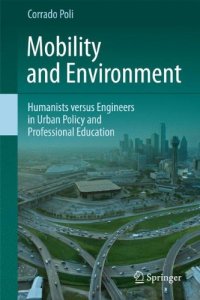
Ebook: Mobility and Environment: Humanists versus Engineers in Urban Policy and Professional Education
Author: Corrado Poli (auth.)
- Tags: Interdisciplinary Studies, Landscape/Regional and Urban Planning, Sustainable Development, Philosophy of Science
- Year: 2011
- Publisher: Springer Netherlands
- Edition: 1
- Language: English
- pdf
The transportation revolution does not simply mean taking a bus instead of a car. It means centering the political debate on the necessity to shift dramatically from a technical to a political culture, and from an economic development oriented policy to an environment centered one.
A radical proposal to transform the currently existing thought on cities, traffic, planning and environment,. Innovative, provocative and best of all ironic.
Richard Peet, Clark University, Worcester, MA, USA
Mobility and Environment is quite an unusual and refreshing contribution to the literature. Through the analysis of urban traffic problems the book deconstructs the present paradigm of urban development, highlights its deficiencies and proposes alternative solutions. The volume would definitely be of interest to geographers and planners, while it also addresses issues that concern sociology, government, philosophy and communication.
Antònia Casellas, Universitat Autònoma de Barcelona, Spain
Our cities have to cope every day with traffic problems. Corrado Poli’s, Mobility and Environment, introduces an innovative perspective on mobility planning by applying environmental policy tools.
Francesco Musco, University IUAV of Venice, Italy
Mobility and Environment calls for a mobility revolution which does not simply mean taking a bus instead of a car: it implies a dramatic shift in the political debate from a technical to a political culture. The author introduces his book by disputing “non-political” Sustainable Development policies which are among the major culprits for the conservatism in environmental policies. For at least forty years, urban mobility policies, based on compulsive infrastructure building, have failed both in satisfying transportation demand and in coping with high environmental impacts. Nonetheless decision-makers keep employing the same professionals and therefore they act as shepherds who commit their sheep in the wolf’s custody. Corrado Poli treats mobility policy as a political, ethical, social and educational issue rather than as a mere civil engineering one. Mobility and Environment challenges some deeply entrenched professional and economic monopolies which negatively affect urban and transportation planning in North America and Europe, and argues the old idea which bounded transportation and communication. A real environmentalist effort in traffic planning should begin from new technologies and from the analysis of citizens preferences. A series of new projects are presented which include mobility demand reduction and focus on democracy in planning.